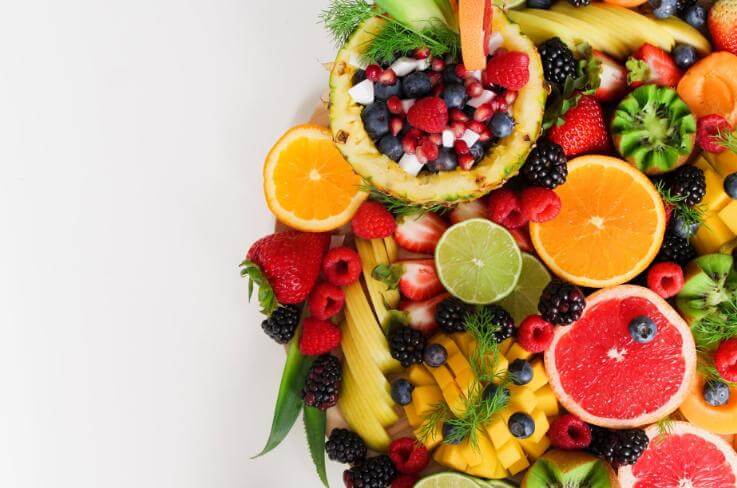How To Prevent Toenail Fungus
No one wants to experience toenail fungus (also called onychomycosis). However, it is relatively...
Is it true that we are what we eat? When we talk about nail health, this bit of common folk wisdom may be plain common sense. While the most stubborn fungal and bacterial infections inhabit a class of their own and require medical attention from a podiatrist, dermatologist, or primary care provider, what you decide to put on your plate should include healthy choices you can make by yourself.
Edible essential nutrients and essential fatty acids form the foundation of your healthy nails, body, and mind. Whether you’re an expert in all things culinary or simply a most superlative smoothie maker, we’ll help you add nail strengthening foods to your shopping list. And first, there are a few things we’d like you to know about the vitamins and elements you need:
Biotin, a B-Vitamin also called Vitamin H, is essential to cell growth. Its function is to help your body convert carbohydrates, proteins, and fats into usable energy. Biotin also helps regulate your LDL (bad cholesterol) and blood sugar. What’s important to know is that biotin is vital to your body’s production of keratin, the protein that already makes up your hair, skin, and nails. Keep in mind that your body doesn’t naturally produce biotin and because it’s water soluble, your body won’t store it for very long either. Signs of biotin deficiency, although rare, include brittle nails and hair loss, but such deficiency may be halted or even reversed by taking over-the-counter or prescribed biotin supplements.

You often hear about B-Complex Vitamins, a designation that includes all the essential water-soluble B Vitamins, including biotin. Thiamine (B-1), riboflavin (B-2), niacin (B-3), pantothenic acid (B-5), pyridoxine (B-6), and folic acid are also included here. If your nails are spoon-shaped or brittle, add essential cobalamins (B-12). Because they encourage healthy cell growth and also help prevent infections, the B-Complex Vitamins can strengthen your body’s power to maintain a healthy nail bed, cuticles, and nail plate as they encourage new growth of strong nails.
Now, for the best part: You may happily dine your way to stronger nails. Consider first the Omega-3 fatty acids. These are essential to overall good health and the best way to get them is through your diet. Brittle, soft nails will be improved by the addition of flax-seed, soybeans, walnuts, and canola oil to your recipes and salads. And be sure to include some oily fish, such as mackerel, salmon, tuna, sardines, or trout in your meal plan twice a week. Other good sources of Omega-3’s include brewer’s yeast, egg yolk, black eyed peas, whole grains, bananas, and mushrooms.
Iron is a mineral vital to nail health and you’ll find it in abundance in oysters, white beans, dark chocolate, and red meat, including beef liver. Iron deficiency may produce spoon-shaped, pale colored nails, or you may see a groove down a nail’s middle. If there’s not enough protein and iron in your diet, you’ll want to add some variety to salads, soups, and side dishes with protein-rich chickpeas, almonds, and tofu. Everything works together to increase and balance your body’s iron supply.
Are there vertical ridges in your nails? You’re more likely to develop them if your diet lacks adequate Vitamin B-12. For strong, healthy nails be sure to include foods rich in Vitamin A, such as eggs and cod liver oil, sweet potatoes and carrots, cantaloupe, dried apricots, pumpkin pie, broccoli, spinach, and most dark green, leafy vegetables. Almonds, hazelnuts, walnuts, and peanuts, wheat germ and corn oil are great sources of Vitamin E; cauliflower, Brussels sprouts, leafy greens, tomatoes, oranges, and winter squash are all high in Vitamin C; and fatty fish, such as tuna and mackerel, beef liver, cheese, egg yolks, and fortified dairy products deliver good amounts of Vitamin D. Another excellent source of B-Vitamins is lentils, a legume rich in protein and fiber, iron, magnesium, potassium, and zinc. You’ll also find B-Vitamins in whole grains, red meat and poultry, eggs, milk and cheese, sunflower seeds, almonds, spinach, and other dark greens. And avocados are packed with Vitamins A, B, and E. So, eat your veggies every day!
Last on our list, but never least, are the amino acids, often called the building blocks of the body. These are found in almost all the foods for nail strength we’ve discussed here. And what, exactly, do these amino acids like arginine and glutamine build? They build the very protein necessary to healthy hair growth and to nail growth without brittleness. Because they strengthen connective tissue, these vital nutrients encourage firm, smooth nails as they help resist free radicals, a toxic byproduct of oxygen metabolism that can cause damage to skin and nail cells.
Remember to be gentle with manicures, nail polishes, and nail polish removers. Cut cuticles open the door to nail-weakening fungal infection, and harsh chemicals prevent good circulation under the nail. Nail lacquers may trap bacterial or fungal infection on the nail bed itself, masking a problem and making it difficult or impossible to detect and treat early. Nail polish removers may dry and damage cuticles and nails.
Keep in mind also that, while it’s preferable to increase nail strength by improving your diet, serious or persistent vitamin deficiencies may be best evaluated and most quickly and effectively treated by a medical professional.
And if you are often on the go, make sure to pack some hand sanitizer to keep your hands clean and nails strong.